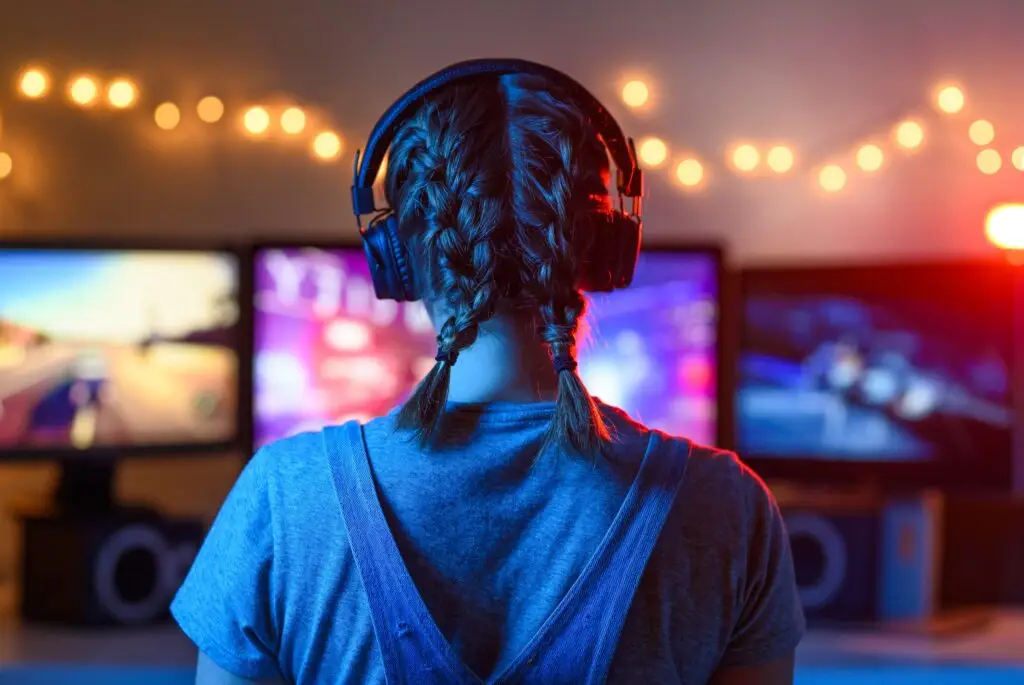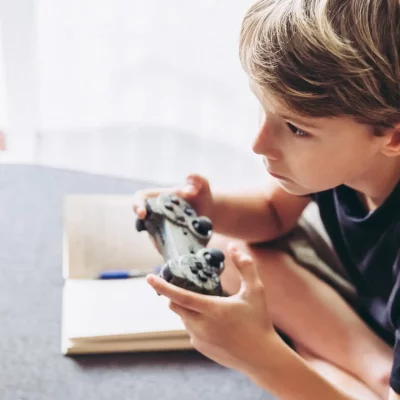In a world where technology is ever-present, video games offer an appealing escape from reality. For many, gaming can be a fun pastime that provides relaxation and social interaction. For some, gaming can evolve into something more serious—video game dependency.
Have your gaming habits crossed the line from healthy pastime to dependency?
Understanding what video game dependency is, how it affects your life, and treatment options to lessen your symptoms can help reduce your need to use video games to help you cope with life in an unhealthy way.
What is video game dependency?
Video game dependency, also known as gaming disorder is when you become so absorbed in gaming that it begins to take over your life.
This disorder is characterized by a compulsive need to play video games, often at the expense of personal relationships, work, school, and physical health.
Unlike casual gaming, where you can put the controller down after a session, video game dependency keeps you coming back, often for hours on end, to the detriment of your mental health.
The blurred line between enjoyment and dependency
Gaming itself can be a healthy hobby or pastime. In moderation, it can encourage imagination, create connections with friends, and reduce stress. On the other hand, when the desire to play video games starts to interfere with your ability to function in daily life, it may signal a deeper issue.
The transition from enjoying video games to developing a dependency can be subtle, often creeping up gradually as you seek more and more time in the virtual world to escape real-world stresses.
What does video game dependency look like?
Video game dependency can manifest in various ways, both mentally and physically. You might find yourself prioritizing gaming over other essential activities, feeling irritable or anxious when you’re unable to play, or even losing track of time while immersed in a game.
Here are some signs that you may be struggling with video game dependency:
- Loss of interest in other activities:
You may find that hobbies, sports, or social events you once enjoyed appeal to you less than gaming does. It’s normal for hobbies to change over time. What can be unhealthy is to drop all of your hobbies for one. It could be a sign of a dependency.
- Preoccupation with gaming:
Even when you’re not playing, you may constantly think about your next gaming session, strategies, or how to improve your in-game performance. This can happen sometimes when you are interested in a topic or activity. Think about the difference between liking something and being obsessed with something. There is a difference between the two, mainly in how obsessive and persistent the thought patterns can be.
- Difficulty cutting back:
Attempts to reduce your gaming time may result in frustration, irritability, or anxiety, making it challenging to limit your playtime. Do you feel like a magnet, always drawn back to video games even when you have other things to do or know you should take a break?
- Neglecting responsibilities:
You might neglect your work, studies, household chores, or personal hygiene as gaming takes precedence. If you choose game time over caring for yourself, your space, and others, it may be a sign of video game dependency.
- Changes in sleep patterns:
Gaming late into the night can disrupt your sleep, leading to fatigue and difficulty concentrating during the day. Gaming at the expense of caring for your body is a strong sign of gaming addiction.
- Withdrawal symptoms:
When you try to take a break from gaming, you might experience withdrawal symptoms similar to those seen in substance abuse, such as restlessness, mood swings, or even physical discomfort. If you try to take breaks from gaming, take note of how you feel.
- Strained relationships:
Your relationships with friends, family, or romantic partners might suffer as you spend more time gaming and less time engaging with loved ones. If you sacrifice time with friends, family, or loved ones because of the fantasy of the video game you’re playing, this can be a sign there is a dependence issue.

What causes video game dependency?
Video game dependency is often the result of a combination of factors. It’s important to understand that gaming itself isn’t the sole cause. It is a coping mechanism for underlying issues.
Common causes for video game dependency include:
- Escapism:
You may find that video games offer an escape from real-world problems such as stress, anxiety, or depression. The immersive nature of gaming allows you to temporarily forget about your troubles and lose yourself in a different world.
- Social connections:
Online multiplayer games provide a sense of community and belonging, which can be particularly appealing if you struggle with social anxiety or feelings of loneliness. The virtual friendships formed through gaming can become a substitute for real-life interactions.
Meeting and connecting with new people can be difficult these days. Gaming offers an easy way to expand your social circle from the comfort of your home, so know that gaming for social connections can be done healthily. To understand if you use gaming in a healthy or unhealthy way, look at the other signs and causes to help determine if your use of gaming is causing undesirable results.
- Instant gratification:
Video games are designed to be rewarding. The immediate feedback, rewards, and sense of achievement you get from gaming can be addictive, especially if you lack fulfillment in other areas of your life.
- Unresolved emotional issues:
Sometimes, unresolved emotional issues or trauma can drive you to seek solace in gaming. The virtual world becomes a safe space where you can avoid dealing with painful emotions or past experiences.
Sometimes, taking a break from thoughts and feelings can be healthy as you process things. Consider how often you “take a break” or even avoid dealing with your emotions or circumstances. This can provide insight into whether you healthily use video games.
- Personality traits:
Certain personality traits, such as impulsivity, low self-esteem, or a tendency towards perfectionism, may make you more susceptible to developing a dependency on gaming. Some of these traits are linked with an increase in stress, which may make you feel like you need gaming more to manage your symptoms.
- Undiagnosed mental health conditions:
Whether anxiety, depression, or specific conditions within those categories like ADHD or social anxiety, coping with an undiagnosed issue can exacerbate the need for video games to handle daily stress.

How video game dependency affects your life
Video game dependency can profoundly impact various aspects of your life. The effects of it can shape your future in ways you might not realize.
Common ways video game dependency negatively affects your life:
- Academic and career setbacks:
Spending excessive time gaming can lead to poor academic performance or missed opportunities at work. Over time, this can hinder your career prospects and limit your potential for success.
- Physical health issues:
Sedentary behavior, irregular sleep patterns, and neglecting proper nutrition can result in a range of health problems, including sleep disorders and chronic fatigue.
- Mental health concerns:
Video game dependency is often linked to mental health issues such as anxiety, depression, and social isolation. The more time you spend gaming, the more disconnected you may become from the real world, exacerbating these problems.
- Strained relationships:
As your gaming habits consume more time and attention, your relationships with family, friends, and romantic partners may suffer. This can lead to loneliness and isolation, fueling your dependency on gaming for social interaction.
- Financial difficulties:
Sometimes, video game dependency can lead to financial problems, especially if you spend money on in-game purchases, subscriptions, or gaming equipment instead of saving or investing in more meaningful pursuits.
Managing your symptoms

The good news is that video game dependency is treatable. With helpful support and practical strategies, you can regain control over your gaming habits and lead a more balanced life.
Effective treatment options for video game dependency:
- Online counseling and therapy:
Speaking with an online therapist at Makin Wellness is one of the most effective ways to address video game dependency. Online therapy can help you explore the underlying causes of your dependency, such as stress, anxiety, or unresolved emotional issues. Through online counseling, you can develop healthier coping mechanisms and work towards achieving a more balanced relationship with gaming.
CBT is a widely used therapeutic approach that focuses on changing thought patterns and behaviors. For video game dependency, CBT can help you identify triggers, challenge unhelpful beliefs, and develop alternative ways to cope with stress or boredom.
- Setting boundaries:
Establishing clear boundaries around gaming time can help you regain control over your daily life. This might include setting specific time limits for gaming sessions, scheduling non-gaming activities, or even taking breaks from gaming to focus on other areas of your life.
- Building a support system:
Connecting with others who understand what you’re going through can significantly impact your recovery. This might include joining a support group (on Facebook, Discord, or live group sessions) or confiding in trusted friends or family members who can empathize and understand what you’re going through.
- Developing new interests:
Finding alternative hobbies or activities you enjoy can reduce your reliance on gaming as a primary source of entertainment. Whether picking up a new sport, learning a musical instrument, or volunteering, exploring new interests can provide a sense of purpose and fulfillment outside gaming.
- Mindfulness and relaxation techniques:
Practicing mindfulness, meditation, or relaxation exercises like progressive muscle relaxation can help you manage stress and anxiety without turning to video games as a coping mechanism.
- Professional guidance:
If you’re struggling to manage your gaming habits independently, seeking professional guidance from an online therapist at Makin Wellness can be incredibly beneficial. Your online therapist will work with you to develop a personalized plan for managing your dependency and build a healthier relationship with gaming.
Reclaiming your life: The path to growth and transformation
Overcoming video game dependency is a journey that requires patience, commitment, and support. Many people struggle with similar issues, so you are not alone if you are struggling with a gaming dependency. There are effective resources and treatment options available to help you overcome your condition.
By addressing your gaming issue, you can regain control over your life, reconnect with the people and activities that matter most to you, and build a future that isn’t dictated by your gaming habits.
What can a Makin Wellness online therapist do for me?
At Makin Wellness, we understand the challenges of video game dependency and are here to support you.
Makin Wellness online mental health services offer personalized counseling to help you to:
- address the root causes of your dependency
- develop effective coping strategies
- create a more balanced life
You deserve to live your life to the fullest, and we’re here to help you achieve that.
Are you ready to take the first step towards reclaiming your life from video game dependency?
Call us at (833)-274-heal or start here to make an appointment with an online video game dependency therapist to take one step closer to a more balanced life.








